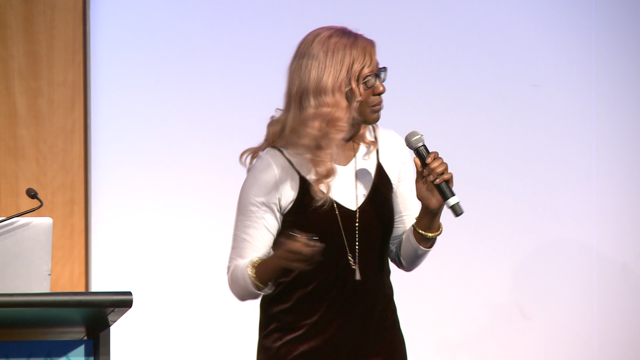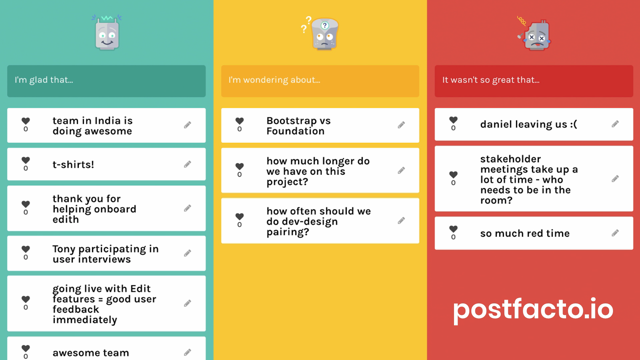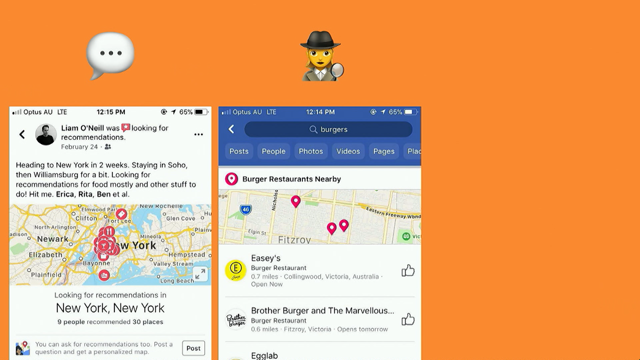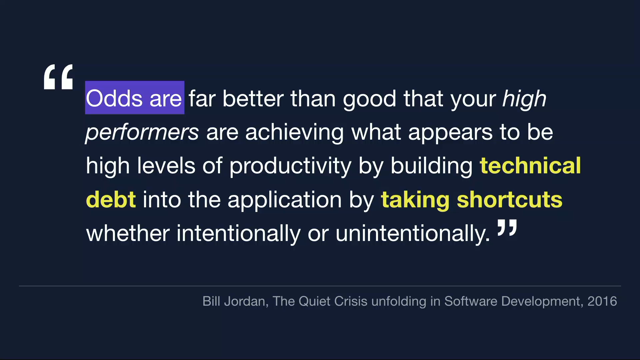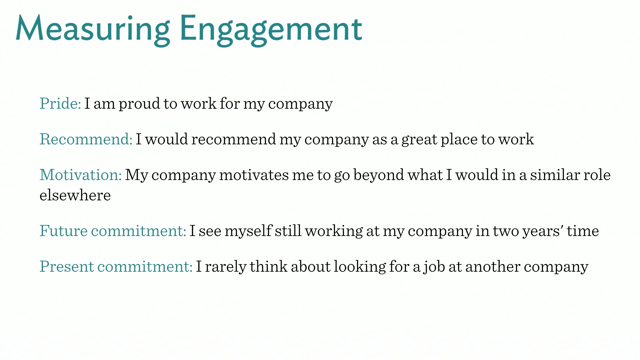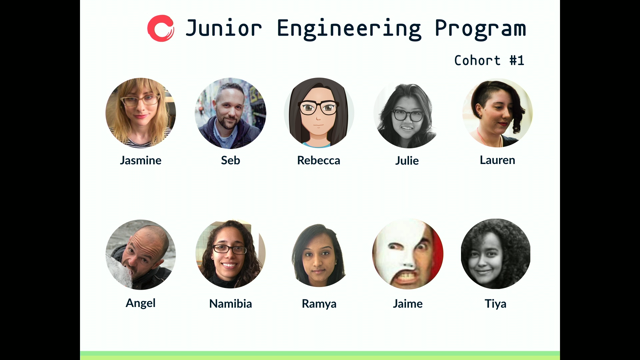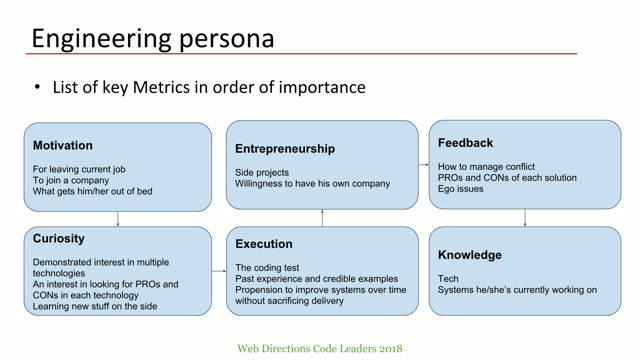Mastering Collaboration – Making Working Together Less Painful and More Productive

(chiptune music) - Thank you.
Lovely to be here.
Yeah the subtitle of the book that came out in April that I wrote is about making working together less painful and more productive.
I think we've all heard today about the fact that it can be painful working together.
I like to sum up our relationship with collaboration like this, it's like a Facebook it's complicated status. I have had the benefit, you mentioned some of my background, that I worked for a while a Frog Design and at Cooper and that are two design agencies that or studies that practised pairing and pair design. And so I have had the experience of being really challenged by someone who is very different from me, wherever Christy went.
And going through the blood, sweat, and tears and getting to a better outcome.
So I know that value.
Many people have just had the torture of being locked in a room doing brainstorming or forced with a group of people to bang their head against the wall and they never get anywhere, and so collaboration is a dirty word.
So I don't know where you fall on that spectrum, but, and before I launched into this, let me talk a little bit about what I mean by collaboration. So I got this from Kate Redder, she and I teach together at the California College of Arts and she laid out this idea there's cooperation on one hand.
So you're gonna lay a fence, you're gonna dig some holes, and you're gonna lay some posts, and you're gonna do some slats.
And the work is not mysterious, it is easy to plan, it's linear.
On the other end of the spectrum is co-creation, which is really that two people, heads down over a keyboard or on a white board hashing through a problem and they're not thinking about managing that information, they're just working on that problem together. That also can be a really unstructured, open. But in the middle you have collaboration.
And where collaboration gets messy is when you have many kinds of people and you have many kinds of stakeholders, subject matter experts, other people who are not in that core collaboration day and day.
So most teams when they get that core functioning, the problems start coming when you're bringing people from the outside.
And the last group I have up here called onlookers. So I'm from California, from San Francisco, I've worked at PG&E, which is the utility there that is currently being blamed for lots of wild fires. It was a 110-year-old utility and I was part of a culture change situation. And what I learned there is if I didn't bring onlookers, if I didn't bring people who I was not immediately having to deal with into my conversations, they would just sit at the edge and lob darts at me. All day long.
Because I wasn't including them.
So, let's talk about why collaboration is important, I think you all get this, but just so you've got my talking points, collaboration is really good when your problems get really complex.
So, climate change.
Boy, you've got a lot of stuff going on, you're not entirely sure what's gonna be the solution here, it's gonna take a lot of different kinds of people. Or it's ambiguous: I don't know what exactly to do. It's really good to get alignment, obviously, because you're bringing people together, and you're getting more highly engaged employees.
You all, many of you are HR people, you understand the value of engaged employees, but for those who don't, remind people that like people who are engaged are much more productive and they do much better work. They're happier.
So that's why we collaborate.
But what gets in the way.
So the first thing I found when I was doing my research and I think it's come up today is that our corporate environments are really about individualism.
Right? You're rewarded individually, you're performance-managed individually, we start to compete for jobs at some point, they get narrower and narrower, all of those incentives go against working collaboratively. Everyone always asks me when I give this talk, they're like, but how do I know, the group of people, who exactly did what and who I reward (stammering) 'cause they're trying to take that collaboration and pick it back apart to its individual components, rather than treasuring the value of that collaboration. Our next issue is that we are very unclear about objectives, and I'll get more into this, but we have a tendency to say, yeah, we know what we're talking about, right? Let's just get started.
Let's just get going.
And then when you get to a certain point and you try to decide whether what you've developed makes sense or not, that's when people come out and start to say, but I thought we were doing X, well I thought we were doing Y.
We love experts.
We love experts partially because they let us off the hook. Well I didn't decide that, she's the expert, she said it, don't peg it on me, man.
And then we are poor communicators without collaboration. I'll talk more about that too.
And so, I flipped these around to come up with tangible suggestions to push back against these forces. So how do you adapt that individualistic environment? How do you set some vision and have really clear objectives, how do you figure out how to explore solutions together, not rely just on experts coming together with a pastiche of solutions and expertise? And how do you fix that communication? And here are some of the things that I came up with and I'm gonna talk about a few of them in specific today in more detail.
And the first I'm gonna talk about is about making space. And so Patima, this morning.
I had to make some changes because I did not want to duplicate many of your great points and I'm gonna try to amplify some and maybe add a little more context.
'Cause I think you had some really good stuff in there. I will admit when I got into this, and again I learned this from doing a pair design situation is that it is not a 24/7 situation.
It's not even a 9-5 situation, collaboration. People need time and space, physical or virtual to be together, and to be apart.
So for example at Cooper, what would happen often is from 9 to noon, you'd work with your design partner hashing through what you were gonna do, and then you'd go to lunch, and then you'd go back to your desks and do your work. 'Cause a lot of the pushback I hear about collaboration is like, it's constant.
And this open seating plan bullshit just makes it worse, right? Where it's like, you can't escape it, the person's always like, hey what about? And Slack is just a virtual version of tapping someone on the shoulder all the time. So I loved your guideline about set some rules for yourself. I used to tell my employees, if you get an email from me after midnight, not only should you take it with a big grain of salt, you should probably embarrass me the next day, like why are you doing that to me? Know that I don't expect you to respond because I did something on some crazy schedule. The other thing I found interesting, and this goes to what Patima was talking about, is I went in with a very strong bias of of course in-person synchronous collaboration is better. Of course it is.
And I talked to enough people with enough diverse experience to realise that that was actually wrong.
That it's actually less about whether you're co-located or remote, it's more about the synchronous versus asynchronous communication.
And partially this is because when we over value, and a lot of people do it, this in-person synchronous communication, you're missing out.
There's a real opportunity cost.
And partially that's because, if we go back to the diversity point, wherever Christy went, there are certain personalities that will doing really well in that and it favours whoever speaks the dominant language really well.
Get me with a pen and a whiteboard, I could make all y'all do whatever I want you to do, I could run the table.
Right, I'm that forceful personality.
I used to have an employee and we would have meetings and I would say we need this and that, and he'd nod, yep. And then next day I would get (exhales) seven-page email full of all of this great information that he was not gonna offer me in realtime. And after the third thing of this, I stopped getting irritated and was like you know, I think I just have to deal with this 'cause it's all good information and he's not a realtime processor.
Why am I favouring my work style over his? So those of you, have you heard of the Bezos white paper approach? A few people, Google does it, Amazon does it. This is the idea that rather than just call a meeting, have the people who are closest to the problem write a three-page paper outlining their argument and whether the argument is what's our people in culture strategy, or what's our next product release, whatever it is, write it down, and then people can comment asynchronously. And what's happening there is you're letting people process that in their own time, you're letting people who maybe need the time to read, rather than listen do that, people who are dyslexic can do their screen-reader things, you're making accommodations again, back to your point, of you're optimising for everyone.
Then you're coming together for synchronous time to make the final decision.
The lightweight, low-key version of this, I call the travelling salesman approach which is go around and I talk to you, and I talk to you, and I talk to you, and then it's this little bit of theatre, G7 summit kind of theatre where we all go, yep, bless it, let's move on.
And so what you're doing there is again you're letting people process in their own time and not demanding that we're making these decisions in this meeting context.
Because what happens in those meeting context? How many times have you been like, oh my god we just have to make this decision, I don't fucking care, we're doing this.
Was that a good decision? That was not a good decision, I was cranky. You're biassing it towards people who have the most authority in the room.
You're not getting the benefit of all of that diversity, you're out there working hard to get.
Another thing is this idea of, I said record sprint reviews, but it could be anything.
Like for those of you who are working across timezones, you can make a video of what happened there. And I don't know that you wanna record the hour of the sprint review, you could record the five minutes of this part of the sprint review and the five minutes of that part of the sprint review. So that people can have access to that information easily. You can keep a live version of your work.
Which means whatever you demoed or whatever your sprint review was, make it easy to find.
Make it so people can just go get that information on their own time.
And put enough context around it so that it shines. And again you don't have to have like, let's have another meeting all about that.
Okay, so secret number two of successful collaboration is about these objectives, and I have this emergency room picture up here because I interviewed an ER doctor and I was super interested to hear all the dirty little clashes that happen between doctors, and he was like, no, can't do that, there's someone dying on the table, there's no time for that.
Oh, I thought, that's interesting.
What is our version of the body on the table? What is the urgency? And by urgency I don't mean do it tomorrow, 'cause we get that kind of urgency all the time. But what happens if you do nothing is my provocation. Because you're ostensibly doing something important by this collaboration.
Because if you're not, if you're just building a fence, just call it cooperation, don't try to dress it up, and get to work.
But if you're really collaborating, you gotta think about what happens if this thing falls apart? Because when collaborations fail, it's not that you do something, launch it and it's horrible, it's that everybody just drifts, they get sick of one another and they go back to their little silos and go back to everyday business.
So, get your urgency by asking what are we really solving? What's the patient on the table there? What's at stake? And to really focus on outcomes over outputs. And you all are leaders, I'm often talking to more individual contributor types, but check yourself whether you are giving objectives as outcomes, versus I would like a six-foot long hexagonal blue widget. Right? I know enough to go, sounds to me like you're trying to solve world hunger, is that what you're trying to solve with your widget? Oh, it was poverty? Great, let's solve poverty.
Helping people get to what the world is gonna be different like after this collaboration, I know it sounds lofty, but literally, how is the world materially different when this thing is done? That will help you because you know, this whole, get me two more points of engagement score, I'm not saying it's not a real metric, is a completely unhelpful, unactionable objective. It doesn't tell you where to go, it doesn't tell you where to start doing hypothesis. It's just that lagging, wherever Eugene went, or a Manesh went, it's that lagging indicator.
So what can you do to make it more actionable? And I find going to I'm a user-centered design person, I find framing it in a user-centered or employee-centered, employees are users, way is the most effective way to state the objective in a way that's actionable.
And then, finally, this is to fix the communication issues, is really about story telling.
So I find myself, if I am talking to somebody and I'm like, I have said this five times, what is he stupid, I can't believe he doesn't get it yet, that's my cue that I have not done good story telling. That's my cue I've not brought this person along. And story telling, you know I give these workshops and these talks and people are like, yeah I know story telling.
And you likely do know storytelling as a consumer of stories.
You may not actually be using and probably aren't using good storytelling techniques at work or you wouldn't be having some of the challenges that you're likely having.
So, Kendall Haven at Stanford has shown our brains literally crave stories.
If we aren't given one, we will make it up, we will leave out information, we will make up information to make it fit a narrative. Have you guys experienced this? I don't know I'm not in the US, but right now I feel like this is very much happening in the US where people are just shoving a narrative out there and everyone's going along with it and other people are trying to fight it with facts. That persuasive story arch is it can't be beat. So, the other thing to note is that these stories don't just happen.
I interviewed Jimmy Chin, have any of you seen "Meru" or "Free Solo"? Yeah.
He's a filmmaker, he makes films with his wife and he makes films climbing crazy mountains. "Free Solo" was Alex Honnold climbed Yosemite 3000 feet without a rope.
And this is the story of that.
His first movie "Meru" is, I mean, I won't ruin it for you, but it's a tale of life and death.
When he showed his first cut to his wife, then girlfriend, Chai Vasarhelyi, who is a documentary filmmaker in her own right, she was like, sweetie, this is guys climbing, there's no story here.
There's literally so much happening.
But it didn't have the elements that actually turn it into a story.
And so my advice is to give someone the job of keeping track of the story.
Because you'll forget, right? You have to think like, okay previous on LOST, what's the last time that we talked to these people, what did we tell them? What has happened since then? And you can retcon that previously on LOST, right? Do it like they do it on TV, which is bring back something from six months ago 'cause it's gonna be relative to this upcoming conversation, prime that and then lay out your story.
And for the person who's keeping track, it's things like, what did we argue about? What was surprising? What are those natural moments of tensions? And I keep doing this thing, I'm doing like you guys know what I'm talking about, right, you have the big inciting incident, the hero begins his journey, there's the climax and there's the denouement. You wanna look for the stuff that makes this really interesting climax and it's gonna be those moments of tension that you got passed.
And this thing that I always say to people the number one mistake that people make with storytelling is what I call the oh shit moment. I'm like the only one swearing up here, sorry, I swear like a sailor, but, I have a done, I have been guilty of this, of writing of say like user scenarios of like, here's Janey, and she wakes up and she goes to work and she uses our product and it's really great, the end. The world's most boring story.
You've got to have some sense of where did things go wrong and did your product help that, or you programme help get people passed that? Or were there things that that person didn't anticipate that happened that they still can recover from? All of those little nuggets will help make what you tell people stick better.
Because it's in the form of a story.
So, just to recap, we've got some forces that push against what we want out of collaboration, because I think, at this point, there's so much written about in praise of collaborations, so many leaders are speaking, hey I want some collaboration, they may not know exactly what that means, they got to get some collaboration.
But we've got to push back against the individualism of the corporate environment, those unclear objectives, those experts that dominate everyone and the poor communication.
By adapting, setting vision, exploring these solutions together, and communicating them. I added this slide because this has come up a couple times today, yeah we need to get the C Suite aligned, we definitely do, you guys should all go do that. You should also give up on that.
You should also help teams be able to adapt the environment locally so they can be, like if they have to wait for it to trickle down, aint never gonna happen, right? Culture happens grass roots too.
So how can you help people create these temporary autonomous zones where they push back against that environment and have different operating procedures than they might normally have.
You know, to say, this is not "Braveheart" you are not Mel Gibson, you are not gonna do this in one go, and change the culture.
I think you guys know that.
So we know that collaboration is good for these complex, ambiguous problems.
And that we want this alignment and engagement, so let's get everyone on the same page.
So, much more in this book here.
But, we'll take some questions, and if you wanna talk to me after, what I find a lot of people wanna ask me about is their very specific situation, sort of Anna Karenina, right? All unhappy collaborations are unhappy in their own ways. So feel free.
Thank you.
(applause) (chiptune music)
